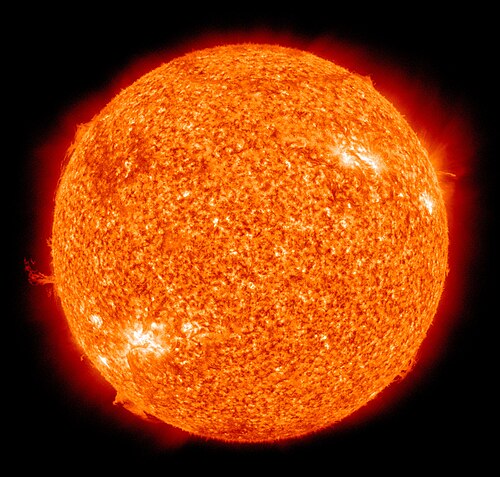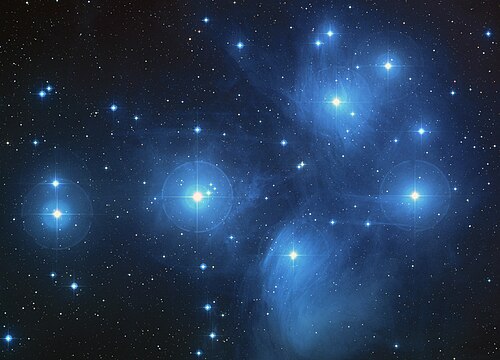Planetnoun
Each of the seven major bodies which move relative to the fixed stars in the night sky—the Moon, Mercury, Venus, the Sun, Mars, Jupiter and Saturn.
Planetnoun
(astronomy) A body which orbits the Sun directly and is massive enough to be in hydrostatic equilibrium (effectively meaning a spheroid) and to dominate its orbit; specifically, the eight major bodies of Mercury, Venus, Earth, Mars, Jupiter, Saturn, Uranus, and Neptune. (Pluto was considered a planet until 2006 and has now been reclassified as a dwarf planet.)
Planetnoun
A large body which directly orbits any star (or star cluster) but which has not attained nuclear fusion.
Planetnoun
In phrases such as the planet, this planet, sometimes refers to the Earth.
Planetnoun
A celestial body which revolves about the sun in an orbit of a moderate degree of eccentricity. It is distinguished from a comet by the absence of a coma, and by having a less eccentric orbit. See Solar system.
Planetnoun
A star, as influencing the fate of a men.
Planetnoun
any of the celestial bodies (other than comets or satellites) that revolve around the sun in the solar system
Planetnoun
a person who follows or serves another
Planetnoun
a celestial body moving in an elliptical orbit round a star.
Planetnoun
the earth
Planetnoun
a celestial body distinguished from the fixed stars by having an apparent motion of its own (including the moon and sun), especially with reference to its supposed influence on people and events
Planet
A planet is an astronomical body orbiting a star or stellar remnant that is massive enough to be rounded by its own gravity, is not massive enough to cause thermonuclear fusion, and – according to the International Astronomical Union but not all planetary scientists – has cleared its neighbouring region of planetesimals.The term planet is ancient, with ties to history, astrology, science, mythology, and religion. Apart from Earth itself, five planets in the Solar System are often visible to the naked eye.
Starnoun
Any small luminous dot appearing in the cloudless portion of the night sky, especially with a fixed location relative to other such dots.
Starnoun
(star) A luminous celestial body, made up of plasma (particularly hydrogen and helium) and having a spherical shape. Depending on context the sun may or may not be included.
Starnoun
(geometry) A concave polygon with regular, pointy protrusions and indentations, generally with five or six points.
Starnoun
(acting) An actor in a leading role.
Starnoun
An exceptionally talented or famous person, often in a specific field; a celebrity.
Starnoun
(printing) An asterisk (*).
Starnoun
A symbol used to rate hotels, films, etc. with a higher number of stars denoting better quality.
Starnoun
A simple dance, or part of a dance, where a group of four dancers each put their right or left hand in the middle and turn around in a circle. You call them right-hand stars or left-hand stars, depending on the hand which is in the middle.
Starnoun
(astrology) A planet supposed to influence one's destiny.
Starnoun
A star-shaped ornament worn on the breast to indicate rank or honour.
Starnoun
A composition of combustible matter used in the heading of rockets, in mines, etc., which, exploding in the air, presents a starlike appearance.
Starverb
(intransitive) To appear as a featured performer or headliner, especially in an entertainment program.
Starverb
(transitive) To feature a performer or a headliner, especially in a movie or an entertainment program.
Starverb
(transitive) To mark with a star or asterisk.
Starverb
(transitive) To set or adorn with stars, or bright, radiating bodies; to bespangle.
Starnoun
One of the innumerable luminous bodies seen in the heavens; any heavenly body other than the sun, moon, comets, and nebulæ.
Starnoun
The polestar; the north star.
Starnoun
A planet supposed to influence one's destiny; (usually pl.) a configuration of the planets, supposed to influence fortune.
Starnoun
That which resembles the figure of a star, as an ornament worn on the breast to indicate rank or honor.
Starnoun
Specifically, a radiated mark in writing or printing; an asterisk [thus, *]; - used as a reference to a note, or to fill a blank where something is omitted, etc.
Starnoun
A composition of combustible matter used in the heading of rockets, in mines, etc., which, exploding in the air, presents a starlike appearance.
Starnoun
A person of brilliant and attractive qualities, especially on public occasions, as a distinguished orator, a leading theatrical performer, etc.
Starverb
To set or adorn with stars, or bright, radiating bodies; to bespangle; as, a robe starred with gems.
Starverb
To be bright, or attract attention, as a star; to shine like a star; to be brilliant or prominent; to play a part as a theatrical star.
Starnoun
(astronomy) a celestial body of hot gases that radiates energy derived from thermonuclear reactions in the interior
Starnoun
someone who is dazzlingly skilled in any field
Starnoun
any celestial body visible (as a point of light) from the Earth at night
Starnoun
a plane figure with 5 or more points; often used as an emblem
Starnoun
an actor who plays a principal role
Starnoun
a performer who receives prominent billing
Starnoun
a star-shaped character * used in printing
Starnoun
the topology of a network whose components are connected to a hub
Starverb
feature as the star;
Starverb
be the star in a performance
Starverb
mark with an asterisk;
Staradjective
indicating the most important performer or role;
Star
A star is an astronomical object consisting of a luminous spheroid of plasma held together by its own gravity. The nearest star to Earth is the Sun.
























